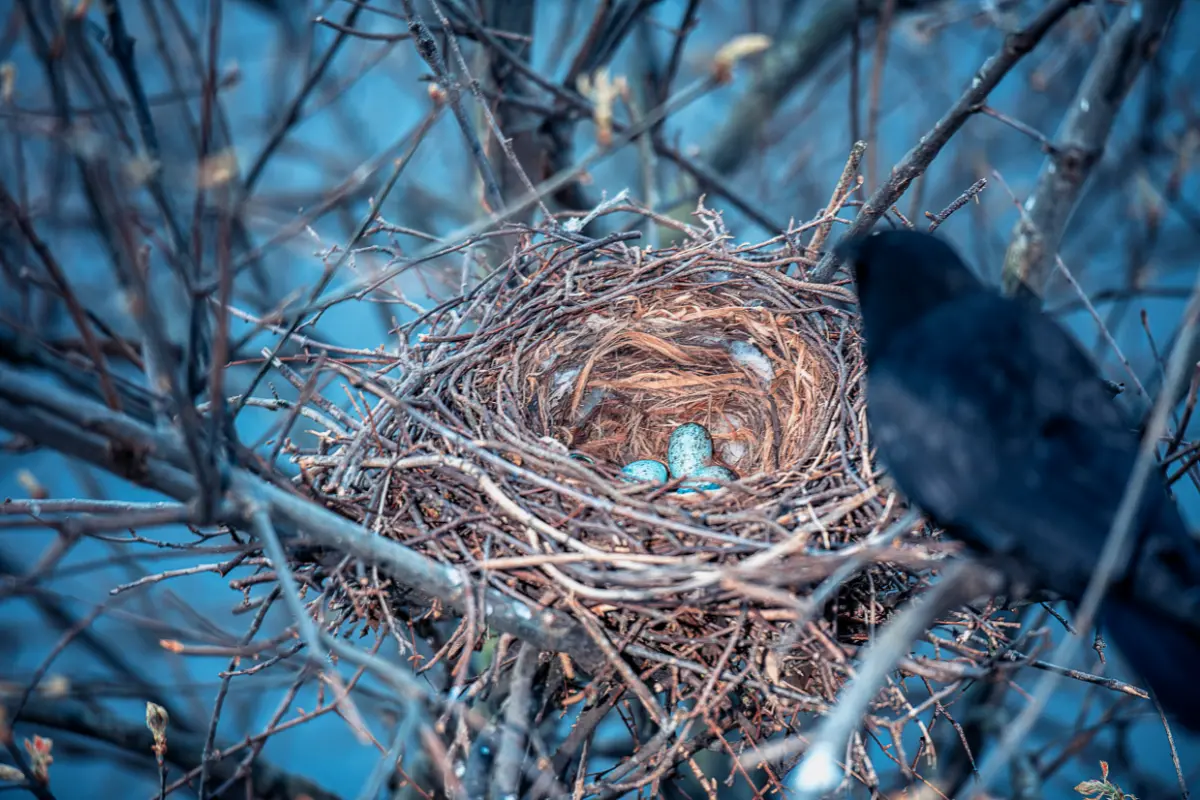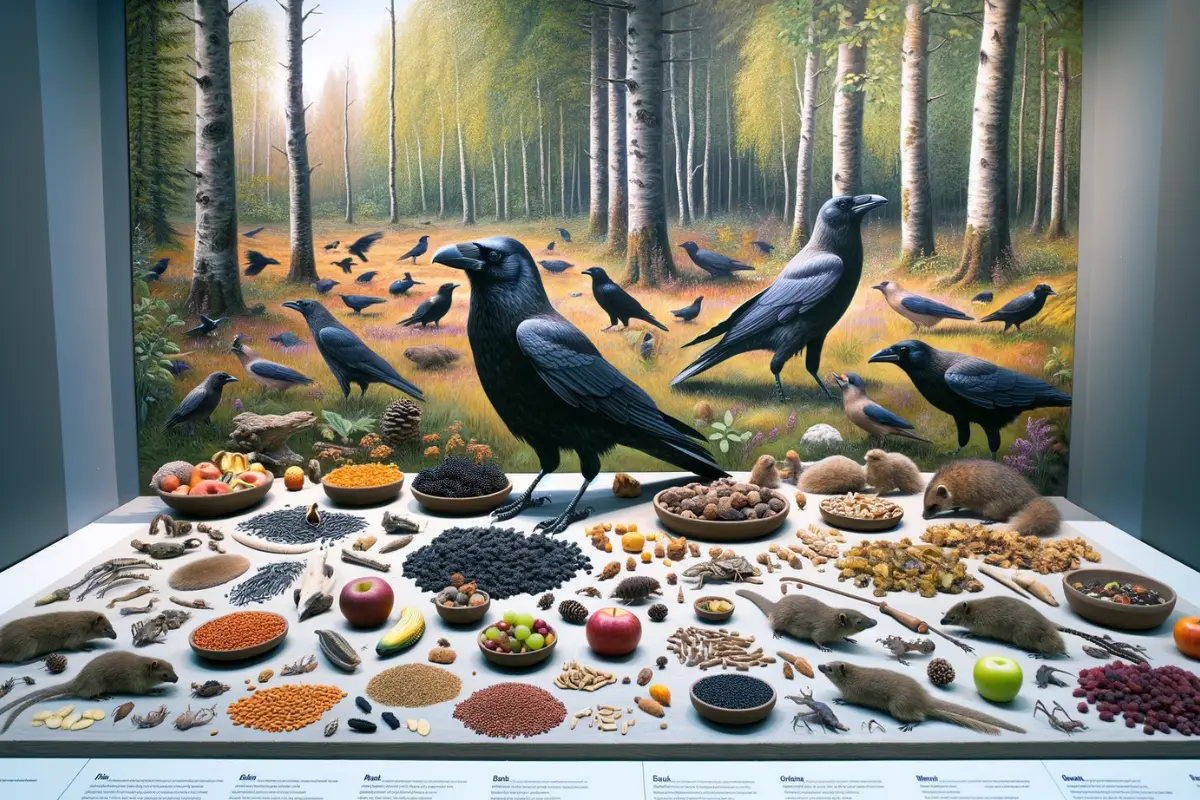Crow eggs are blue or greenish in color and have black or brown blotches. Crows lay their eggs in nests that they build. The eggs can be 1.4 inches to 1.9 inches in length and around 1.5 inches wide.
The process of crow egg laying is called oviposition. Female crows develop eggs within their reproductive system. Once the eggs are matured, they are laid through the oviduct. The female crow incubates the eggs to keep them warm till they hatch.
The eggs go through an incubation period of 16 to 18 days. Both male and female crows take turns to look after the eggs during this time. There are various predators from whom they have to protect the eggs.
What Do Crow Eggs Look Like
Crow eggs are small and oval-shaped. They often have beautiful blue or green shells, though the color can vary. The egg is covered with black or brown blotches that help crows keep the eggs hidden through camouflage.
The shell of the egg is fragile and has a smooth texture. The shape and size are almost identical to other birds. The color will help you to distinguish between crow eggs and the eggs of other birds.
The presence of biliverdin and protoporphyrin in the shell of the eggs makes them blue. Crow eggs, however, are not the only blue eggs among bird species. Here is a list of other birds that lay blue eggs:
- Dunnocks
- Starlings
- American Robin
- American Crow
- Blackbirds
- House Finches
- Common Myna
- Gray Catbirds
- Blue Jays
- Bluebirds
- Snowy Egret
- Magpie, etc.
How Do Crows Lay Eggs
The laying of eggs of crows goes through different stages. First, a male crow tries to attract a female crow for mating. Crows are monogamous and do not look for new mates every year. Instead, when they mate, they mate for life.
A male crow tries to attract a female crow by spreading feathers and bowing their heads. When female crows show interest in the male crow, they begin performing different r courtship behaviors. They fly around and mimic each other’s flying skills. This is a wonderful sight to enjoy.
Once both male and female crows agree to be in the bond, they perform a cloacal kiss. They come closer and rub their cloacas together. As male crows do not have external penises, they use their cloacas for this. The male crow shares its sperm to its partner during the kiss. If the mating is successful, the female crow conceives. On average, crows can lay 5 to 7 eggs.
Female crows do not lay all the eggs at once. Instead, they lay one egg a day, usually in the morning. They may lay more than one egg sometimes on rare occasions.
Different Stages of Crow Eggs and Babies
The eggs and the chicks go through different stages before becoming mature. Here are the stages that they have to overcome.
1. Incubation of Crow Eggs
The incubation period of crow eggs lasts about 18 days. During this time, the female crow has to keep the eggs warm by sitting on them. The male crow is responsible for bringing food for them and protecting the eggs when they are in nests.
Though female crows are gentle, they can become aggressive if you try to harm the eggs. Besides, they are very intelligent and come up with different tricks to save the eggs. Between 17 and 18 days, the eggs are ready to hatch.
2. Nestlings
Once the eggs are hatched, newborn baby crows come out. The chick’s eyes are not completely built and so remain closed. They cannot see for the first few days of their life. They are dependent on their parents during this time. This stage of the chicks is known as nestlings. They are very light, weighing no more than 16 grams.
The nestlings are helpless, and the mother looks after them all the time. The male parent goes out to find food for both his partner and the chicks. Mother crow feeds her babies till they grow up. It takes more than a month for the nestlings to leave the nest.
3. Fledglings
Chicks only leave the nest when they are ready to fly. They learn to hunt, forage, and feed themselves from their parents. The parents keep feeding them at this stage till they learn properly to find their food.
Sometimes, when the chicks’ wings are strong enough to fly, they try to fly on their own. Some of them fail and fall on the ground. The parents will check on them, and if they survive the fall, they will continue looking after them.
However, parents often abandon the chicks if the babies are attacked by predators or touched by humans. Therefore, you should avoid touching these baby birds.
How Often Do Crow Lay Eggs?
Crows usually lay eggs once a year during the breeding season, which generally occurs in the spring. The exact timing often varies depending on the species and geography. They first build a nest before the mating season.
Some crows may have two broods. Cape crow and Hooded crow are such exceptional species. American crow or other species can also have two broods sometimes. They make a second attempt if the first attempt becomes unsuccessful due to predators’ attacks.
Crows do not lay eggs in winter. Their food sources become scarcer, and the harsh weather conditions are not helpful for egg incubation and chick rearing. The availability of food and ideal temperature make spring the season ideal for their breeding.
Where Do Crows Lay Eggs
Crows begin building their nests in early March when the breeding season begins. Both male and female crows take part in building the nest. They do not lay eggs in the same nest twice.
They look for warmer places and where they can hide their nests. They build spacious nests where seven to nine eggs can be accommodated. The parents do not live in the nests. They take their position in the nearby branches of the tree.
What Do Crow Nests Look Like?
Crows’ nests are much bigger and more spacious than the size of the birds. Carrion crows can build 1.5 ft wide nests with about 8 to 10 inches depth. Different types of sticks, twigs, grass, mosses, animal fur, dung, mud, and leaves are used to build the nest.
Crows choose the sticks that will help the nest take camouflage to its surroundings. Crows sometimes build a second nest as a backup for the first nest. It also works as a decoy to protect the eggs from predators.
How Crows Protect Their Eggs
Crows are caring parents, and they take several steps to protect them. As the eggs are vulnerable and there are so many predators of the eggs, crows come with different tricky ideas.
1. Build Nests in Concealed Areas
A common habit of crows is to build their nests in hidden places. They build much larger nests and make them in concealed places so that they cannot be seen easily. You will find it difficult to notice their nests in forests. However, in cities, they often build nests in tall buildings. Crows observe various locations before building the nest.
2. Crows Do Not Use the Same Nest
A predator may come back to find eggs in the same nest again. Crows, therefore, do not use the same nest. They build a new nest in every breeding season. Since the birds mate for life, they work with cooperation to build the nest.
3. Crows Become Aggressive
Crows are usually gentle birds. The female crows are calm and polite. However, they become more aggressive during the breeding season. They show aggression when another bird intrudes into their territory. Crows have strong beaks and constantly attack predators to fend them off.
4. Crows Build A Decoy
Crows often build a second nest as a decoy. It provides additional safety for the eggs and the nestlings. Sometimes, hawks look for crow eggs or eggs of other birds. When the big bird finds an empty and decoy nest, it usually changes direction.
5. The Crows Stop Making Calls
Parent crows stop making calls once they have laid the eggs. They keep silent as it can draw the attention of predators. You will notice that the crows you hear in your backyard become much quieter during the spring and breeding season. Keeping silent is another representation of their intelligence.
What to Do If You Find Crow Eggs
Crows often build their nest in skyscrapers if they do not find any suitable tree. You should be cautious when dealing with the eggs if you find any. Here are a few things you can do:
- Avoid touching the eggs in the first place. You do not need to interfere. Crows are caring parents, and they take good care of their eggs. They will find and restore the eggs.
- In case the eggs have hatched, the parents might not take back the chicks if you interfere. The parents may not come near if they watch you from nearby trees.
- If the crows do not take back the eggs, you can look around to see if there are any nests around. Without touching the eggs, make some arrangements to hide them. Create a carrier around the egg if there is a risk of predators. Cats and other birds may try to harm the eggs.
- The eggs can be abandoned if the parents do not take them back for a long time. Contact wildlife experts for suggestions regarding how to take care of the eggs.
- The eggs need to be kept warm. You may not be able to take the necessary steps. Therefore, inform the experts.
Predators of Crow Eggs
Crow eggs have many enemies and predators. It can be other birds that fly away with the eggs. Their enemies are not limited to birds, though. Some four-footed animals can climb trees and steal eggs. Here is a list of common threats for crow eggs:
- Raccoons
- Other crows
- Squirrels
- Blue Jays
- Magpies
- Owls
- Hawks
- Snakes
- Cats
- Rates
- Foxes
- Coyotes
- Gulls
- Weasels
- Skunks
- Large insects
- Opossums
- Bears
- Humans
FAQs
Do male crows lay eggs?
No, male crows do not lay eggs. The egg is only laid by the female eggs. The male crows transfer their sperm during the cloacal kiss, and the female birds lay eggs.
Do crows come back to the same nest every year?
No, crows never come back to the same nest. They build a new nest every year. It is a part of their precaution to protect the birds against predators.
Are crow eggs black?
No, crow eggs are not black. The shells are usually green or blue. The shell is often marked with brown and black blotches. Such appearance helps the eggs take camouflage to stay hidden.
Can I eat crow’s eggs?
Crow eggs are not traditionally eaten by humans. In many places, it is illegal to disturb crows and their eggs. Besides, some studies show that crow eggs can be harmful to your health. They are edible, but you should not attempt to eat them for legal reasons.
Do crows steal eggs?
Yes, crows steal eggs from the nests of other birds. Some species of crows also steal the eggs of other crows. This behavior is known as kleptoparasitism. It is one of their survival strategies where crows take advantage of the efforts of other birds.
How long do crows nest for?
Crows build their nest before laying the eggs and use the nest for about 2 to 3 months. During this period, the birds build nests, lay eggs, incubate, and raise the chicks. The specific duration can vary for different birds and species.
Do crows eat their own eggs?
Crows and ravens are caring parents. They value their crow family and do not eat their eggs. Nonetheless, in extreme conditions, when their habitat goes through negative changes, they may eat their own eggs out of stress, anxiety, and depression.
Conclusion
Crow eggs are beautiful. Crows don’t typically abandon their eggs or babies. A female crow can lay 2-6 eggs in a clutch. These intelligent birds take different strategic steps to protect the eggs. The breeding pair may build a decoy nest and take care of the young birds. The omnivore birds take proper care of their eggs with much care and love.







